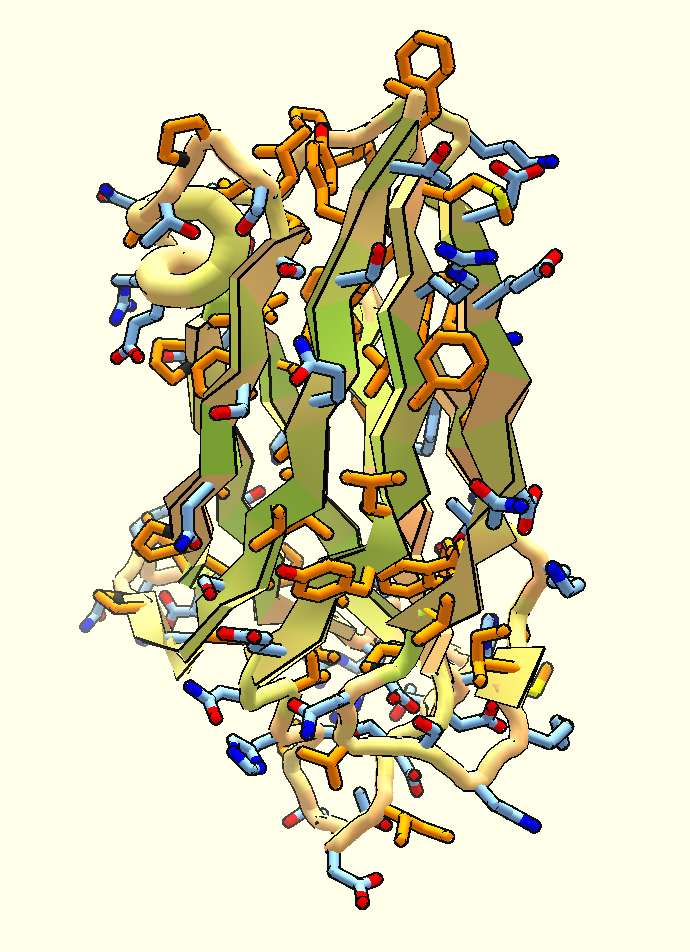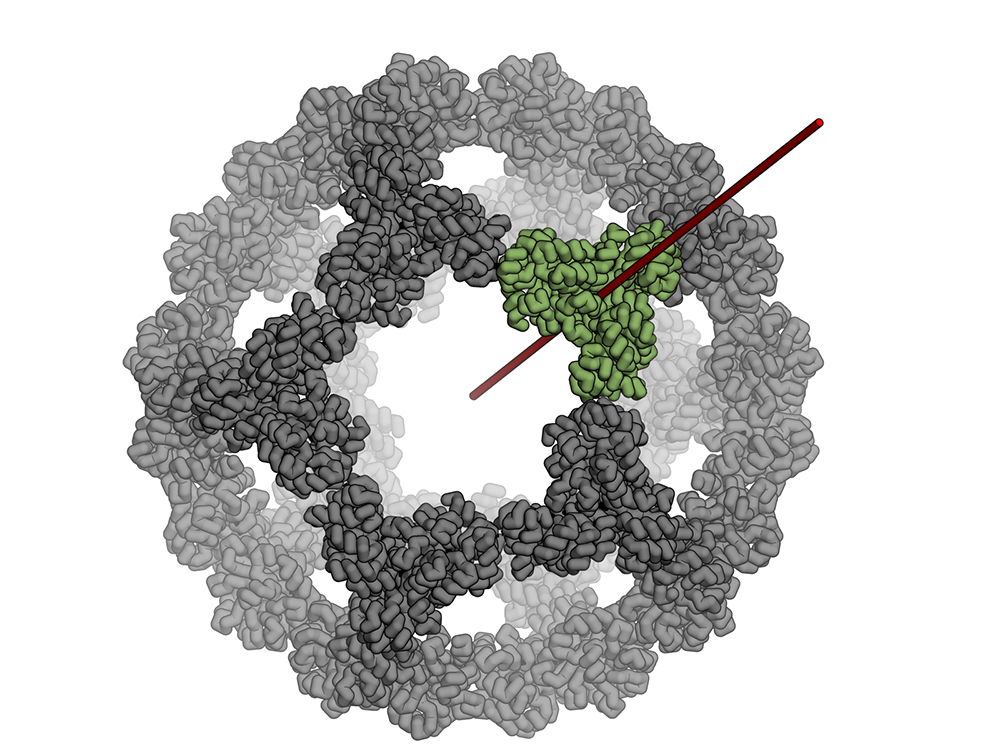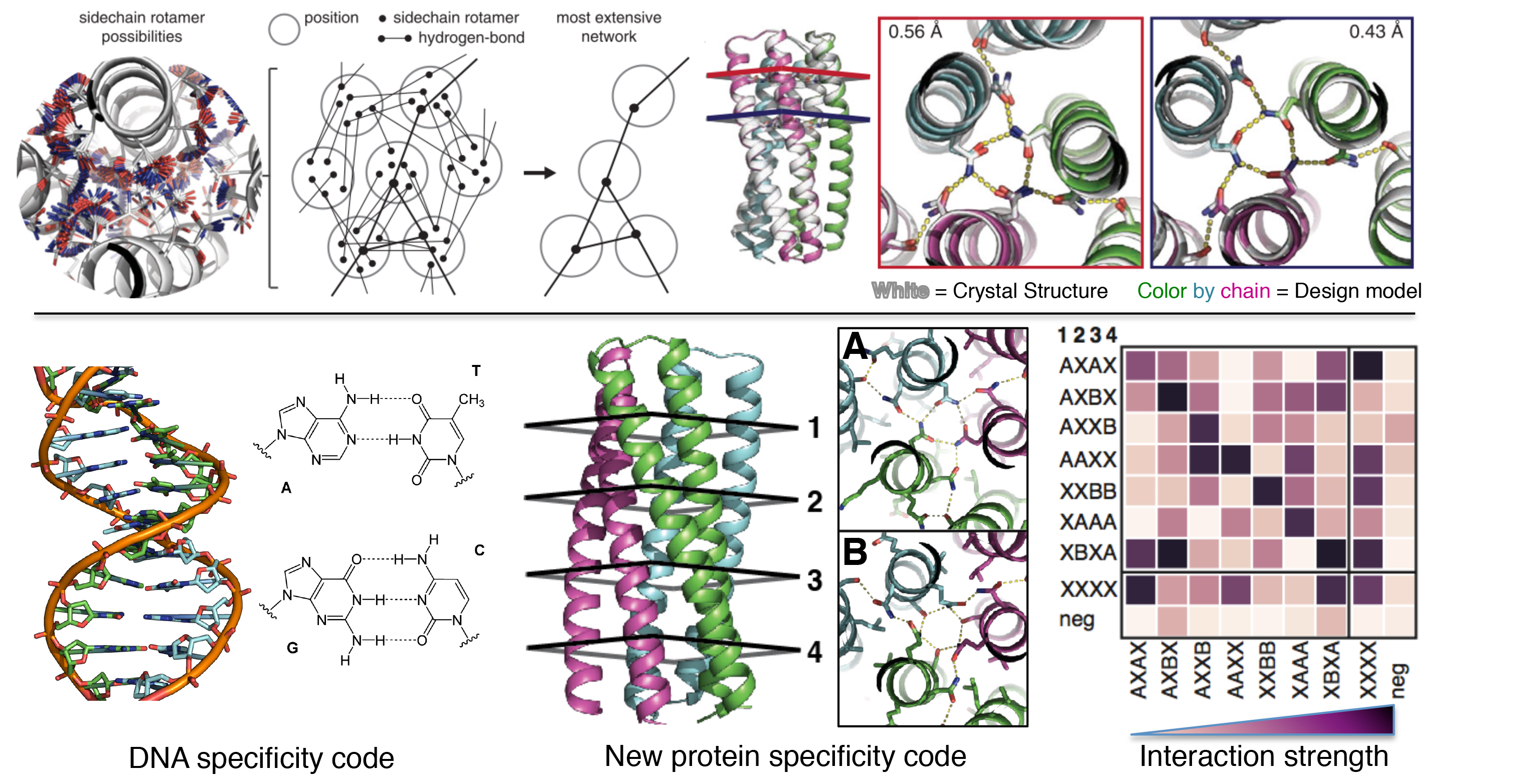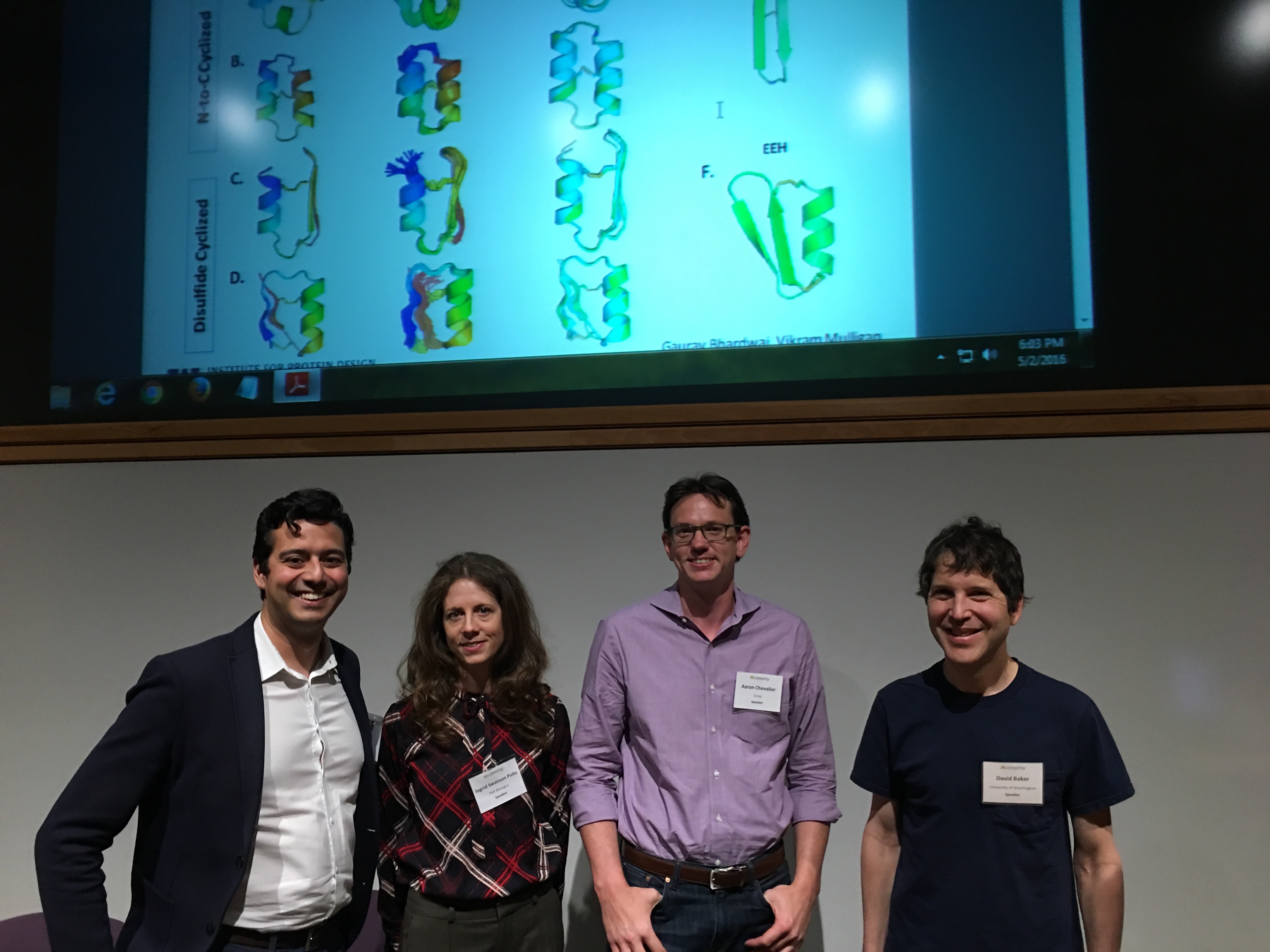Category: Archive
-
Stopping Influenza with Flu-Glue
Today, a multidisciplinary team of researchers at the University of Washington, Fred Hutch, and The Scripps Research Institute published in Nature Biotechnology the computational design of a trimeric influenza-neutralizing protein that binds extremely tightly to the H3 hemagglutinin of 1968 Hong Kong pandemic influenza virus (A/Hong Kong/X31/1968). It also cross-reacts with human relevant H1, H2 and…
-

Limb Girdle Muscular Dystrophy Day and New Foldit puzzle
Today is Limb Girdle Muscular Dystrophy Day, and the Institute for Protein Design is collaborating with the Jain Foundation and Foldit community to to model the structure of human dysferlin protein (DYSF), an important protein for normal muscle function. Numerous mutations in the gene that encodes DYSF protein are known to be the cause of…
-

Icosahedral protein nanocage – new paper and podcast
The Baker lab, in collaboration with Neil King, Trisha Davis and Tamir Gonen’s labs, recently had a paper published in Nature about a stable icosahedral nanocage whose applications could span anywhere from drug delivery to vaccine design! The title is “Design of a hyperstable 60-subunit protein icosahedron” and it was published online June 15, 2016.…
-

De novo design makes a splash
A paper recently published in Science by several members of the IPD, in collaboration with others, entitled “De novo design of protein homo-oligomers with modular hydrogen-bond network-mediated specificity,” discusses designing proteins in a similar way to DNA so that they may be used to engineer structures. Geekwire has written up a great article about the paper;…
-

IPD at Xconomy’s EXOME’s Seattle’s Life Science Disruptors 2016
On Monday, representatives from the IPD spoke on a panel at Xconomy’s EXOME’s Seattle’s Life Science Disruptors 2016 event. It was titled “Proteins Like You’ve Never Seen” and included Lucas Nivon (Cyrus), Ingrid Swanson Putlz (PvP Biologics), Aaron Chevalier (Virvio), and David Baker. The event’s description was as follows: Seattle is one of the few…
-

Franziska Seeger @ Ignite Seattle
On February 18th, WRF Fellow Franziska Seeger gave a talk about proteins at Ignite Seattle. Presenters have 5 minutes to speak to the audience and deliver whatever point they are trying to get across. They also cannot control their slides, so they have to have their timing perfect. Talk about pressure! However, we believe that…
-

Arzeda and Mitsubishi Rayon Ltd announce new industrial collaboration
On February 9th, Arzeda, and Mitsubishi Rayon Ltd announced that they would “collaborate on development of new processes for industrial chemicals production.” Read more about it on Mitsubishi Rayon’s website, here, or on Arzeda’s site, here. Arzeda is an IPD spin-out, of which David Baker is a co-founder and Scientific Advisory Board Member.
-
July IPD News Roundup
RESEARCH In an article out in Structure, Baker lab postdoc Dr. Hahnbeom Park in collaboration with IPD Assistant Professor Frank DiMaio investigate the origin of protein structure refinement from structural averaging at the residue level. Structure refinement has long been a challenge in the field of protein structure prediction and it aims to improve homology…
-
June IPD News Roundup
RESEARCH A new Science paper is out from Dr. David Baker and IPD collaborator Dr. Tamir Gonen (HHMI Janelia Campus) titled Design of ordered two-dimensional arrays mediated by noncovalent protein-protein interfaces. Graduate student Shane Gonen and Dr. Frank DiMaio describe a new computational approach to design two-dimensional protein arrays with a number of exciting potential applications…
-
IPD Launches First Company Spinout
Seattle, WA Today, we are announcing that Cyrus Biotechnology, has been successfully launched from the UW Institute for Protein Design (IPD) to pursue commercialization of an innovative user friendly software as a service (SaaS) cloud computing solution for distribution of the powerful “Rosetta” protein structure prediction and design algorithms. “Cyrus is the first new IPD…
-
May IPD News Roundup
The May IPD News Roundup covers a new Science paper from IPD Assistant Prof Frank DiMaio, a KOMO News interview with Translational Investigator Ingrid Swanson Pultz on celiac disease, and much more! At the link.
-
New structure solved for hyperthermophilic DNA virus
A new Science paper is out from IPD faculty Dr. Frank DiMaio titled A virus that infects a hyperthermophile encapsidates A-form DNA. Read the abstract below and the article at the link: http://www.sciencemag.org/content/348/6237/914.full.pdf Extremophiles, microorganisms thriving in extreme environmental conditions, must have proteins and nucleic acids that are stable at extremes of temperature and pH. The nonenveloped,…
-
One-carbon pathway PNAS paper featured in Nature Chem Bio
The exciting protein design work by IPD researchers and collaborators in PNAS titled Computational protein design enables a novel one-carbon assimilation pathway has been featured in a Nature Chemical Biology News and Views piece. Follow the link to check it out: nchembio.1819
-
April IPD News Roundup
April IPD News Roundup is live at this link!
-
March IPD News Roundup
The March 2015 IPD news roundup is here! A new publication in PNAS on a completely novel metabolic pathway made via protein design and more. Read about it at the link.
-
February IPD News Roundup
This month’s roundup features an interview and two papers from IPD Assistant Professor Frank DiMaio as well as a new Science paper from the Baker lab on trapping transition states using protein design. Read more at the link.
-
AAAS 2015 Plenary Lecture by David Baker
David Baker, IPD Director and Professor of Biochemistry at the UW was the Plenary Speaker at this year’s AAAS meeting in San Francisco. A video of his talk, titled ‘Post-Evolutionary Biology: Design of Novel Protein Structures, Functions, and Assemblies’ covers a breadth of information on ongoing IPD research and can be viewed at the following…
-
January IPD News Roundup
A little late this month but it’s here!!! The January news roundup talks about a new Nature journal paper from the Baker lab, the second Mini Symposium, and much more. Follow the link and read more!
-
Independent Study Opportunity for Foster MBA Students
The Institute for Protein Design is seeking an MBA student to work with Institute leadership to collect market data on small molecule therapeutic targets for protein design. More information about this exciting independent study opportunity can be found on our Employment page here.
-
IPD Mini Symposium – Jan 20 2015
Our next Mini Symposium will be hosted on Jan 20 2015 and will feature Drs. Bill DeGrado (UCSF) and Gevorg Grigoryan (Dartmouth) speaking on “New Approaches to Protein Design”. More information at this link.
-
December IPD News Roundup
We wrapped up 2014 with a bang – introducing a new logo, getting a major award for celiac disease research, and successfully hosting our first Mini Symposium! Follow the link to read more.
-
November IPD News Roundup
Staff and scientists of the IPD and Foldit volunteered at Pacific Science Center’s Life Sciences Research Weekend this month – teaching budding scientists about the awesomeness of protein folding! Pics from the event and more Institute news at the link.
-
IPD Mini Symposium 2014
The UW Institute of Protein Design (IPD) presents a Mini Symposium on “Sweet Spots for Designed Proteins as Therapeutics” on Weds Dec 10 at 9 AM in HSB D-209. Follow the link to get more details! We hope to see you there!
-
October IPD News Roundup
Happy Fall from the IPD! Read about our October happenings in this month’s news roundup. Click here to read more.
-
Custom design of novel alphahelical bundles
A new paper is out in this week’s issue of Science entitled High thermodynamic stability of parametrically designed helical bundles. Using novel computational design methods, extremely stable helical bundles can be custom designed with fine-tuned structural geometries for a number of applications. Read more about this exciting work at this link.
-
September IPD News Roundup
We awarded our first round of WRF Innovation Postdoctoral fellowships this month! Follow the link to learn about our new fellows and to catch up on the research ongoing at the IPD.
-
August IPD News Roundup
The Foldit community has been leading the charge in the computational design of proteins to bind Ebola. Learn more about this work and other ongoing Institute news at the link.
-
Engineering an Oral Therapeutic for Celiac Disease
Learn how the IPD and Translational Investigator Dr. Ingrid Swanson Pultz are developing Kumamax, an oral therapeutic candidate for celiac disease. A slide presentation and more information at the link.
-
Hiking the South Peak of The Brothers
Watch a video documenting a recent hike at The Brothers in the Olympics. IPD scientists, mountain goats, and stellar views – oh my!
-
The Power of Charity for Protein Design
Read a post about how the power of volunteer computing drives advances in protein design! Learn more at the link.
-
Letter from the Director – IPD Update
Read a letter from Institute for Protein Design Director Dr. David Baker summarizing the exciting accomplishments and progress made at the IPD in the past year.
-
July IPD News Roundup
This July, IPD staff and scientists ventured outdoors for a conference and for some fun adventures. Learn more at the link.
-
June IPD News Roundup
June at the IPD welcomed some new team members and saw some exciting new publications! Learn more here.
-
Removing T-cell Epitopes with Computational Protein Design
In a recent PNAS paper entitled “Removing T-cell epitopes with computational protein design”, IPD researchers combine machine learning with computational protein design to demonstrate immune silencing of protein targets. This deimmunization has the potential to reduce or eliminate immunogenicity of protein therapeutics. Learn more at this link.
-
Women in Science Lunch Discussion
A recent Nature issue exposed the dismaying fact that many women are deterred from pursuing a career in science, especially at the highest levels (postdoctoral positions, faculty position, scientific advisory boards to start up companies, etc). To talk about this significant gender gap in science and the issues female scientists face, Baker lab members participated…
-
WRF Awards $8M for the IPD Innovation Fellows Program
May 15, 2014 With a very generous $8 M gift from the Washington Research Foundation (WRF), the IPD has launched the WRF-IPD Innovation Fellows Program supporting research partnerships between the IPD and other Seattle-area research institutes or UW departments. We are recruiting exceptionally talented researchers who have just finished their PhD to join expert laboratories at local institutions where they…
-
Beyond Evolution: Protein Design News and Art
Re/Code writer James Temple has written an interesting article on David Baker’s efforts to design a new world of proteins. The article covers the IPD efforts to design proteins that neutralize the flu virus, Alzheimer’s disease amyloid protein, and how the IPD is engaging citizen scientists in the Rosetta@home and Foldit projects. Learn more at…
-
Automating Human Intuition for Protein Design
IPD researchers in the Baker group have improved protein computational design algorithms by “Automating human intuition for protein design.” Read more at this link.
-
Institute for Protein Design Infograph
[soliloquy id=”345″]
-
Rosetta Designed Protein (Toca 511), Now Offering Hope to Brain Cancer Patients
Brain cancer is a serious unmet medical challenge, and Washington state is one of the leading research clusters working on glioblastoma. Here we report on how RosettaDesign proteins are being used to treat brain cancer! Read more about this important translational protein design effort here.
-
UW establishes the Institute for Protein Design
Hello, world.
